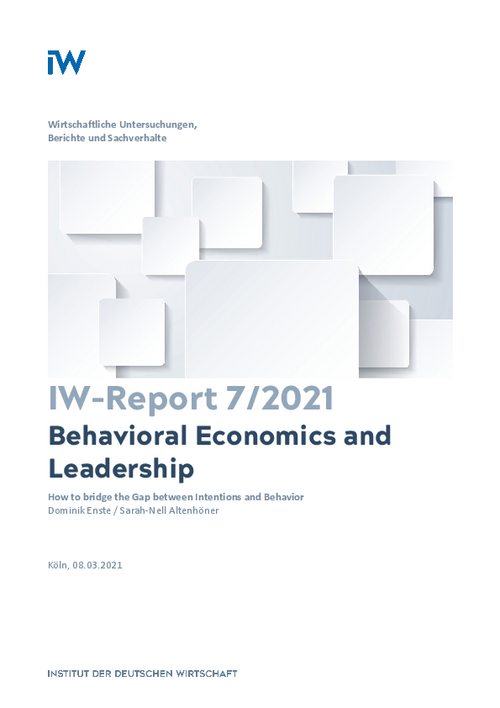The difference between existing intentions and actual behavior occurs in various forms, such as procrastination or companies not being able to implement planned changes, which may lead to competitive disadvantages in ever dynamic business environments.

Behavioral Economics and Leadership: How to bridge the Gap between Intentions and Behavior
IW-Report

The difference between existing intentions and actual behavior occurs in various forms, such as procrastination or companies not being able to implement planned changes, which may lead to competitive disadvantages in ever dynamic business environments.
While current research is strongly focused on attitudes, motivation and the formation of intentions, particularly with regards to ethical consumerism, this study aims to explain the specific discrepancy between intentions and behavior. Based on a review of social psychology, behavioral economics and management literature, the intention-behavior gap and the reasons for the failed translation are examined and room for improvement is outlined. The derived findings are then applied to the examination of the transformational and transactional leadership styles and existing management tools.
Within the framework of the model of behavioral formation, the intention-behavior gap can be defined as the discrepancy between an individual’s willingness and effort to perform an action and the actual performance or omission of said action. Three types of barriers can be identified: cognitive, situational and environmental. Based on dual systems theories, this study finds that the intention-behavior gap occurs whenever the short-sighted, intuitive system dominates cognitive processing. The main causes for this are the effects of cognitive strain, ego depletion, decision fatigue and choice overload. This study determines the status quo bias, social norms and availability heuristic as the main biases of the intuitive system, which lead to a failure to implement intentions. The third section applies these insights to develop a model of behavioral patterns in employees – the Five-Employee Typology, which highlights the importance of adaptive leadership. Subsequently, this study suggests management activities based on behavioral economics to enhance existing tools, with a special focus on effective leadership as an instrument.

Dominik Enste / Sarah-Nell Altenhöner: Behavioral Economics and Leadership – How to bridge the Gap between Intentions and Behavior
IW-Report


Grillen mit Fleischklassikern, Bio- oder veganen Alternativen - Was kostet es?
Fleisch und Würstchen kommen nach wie vor oft auf den Rost, obgleich der Appetit nach veganen Alternativen wächst. Wer sich für einen Grillteller in Bio-Qualität entscheidet, muss tiefer in die Tasche greifen als für einen mit konventionell hergestellten ...
IW
Grillsaison: Bio-Grillen hat seinen Preis
Fleisch und Würstchen sind nach wie vor das beliebteste Grillgut der Deutschen. Doch die Nachfrage nach veganen Alternativen steigt. Wer sich für Bio-Produkte entscheidet, muss allerdings tiefer in die Tasche greifen. 80 Prozent mehr kostet ein ...
IW